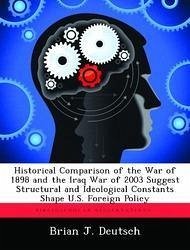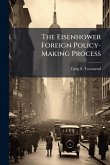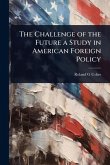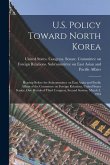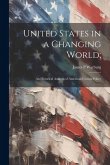In the words of Mark Twain,"History doesn't repeat itself- at best it sometimes rhymes." As Americans, we need to learn as much as we can from history because it has the potential to guide us when we find ourselves in similar situations in the present. This paper offers a glimpse into U.S. foreign policy in the War of 1898 and the Iraq War of 2003 and the structural and ideological factors involved in shaping it. To do this, this paper looks into the constitutional "struggle" between the Executive and Legislative branches of government along with their ideology, and shows how these factors combined to shape U.S. Foreign Policy. In researching these two similar but different wars in U.S. history, it can be shown that when congress is divided along party lines fairly evenly, the president has more power to shape foreign policy, and that policy will usually reflect his or her ideology. When there is a clear majority in congress, congress has more of an impact in shaping foreign policy and can force the president, regardless of his or her ideology, into foreign policy decisions that reflect congresses ideology. By studying these two foreign policy events in U.S. history, this paper examines how the ideological and structural factors inherent in our government combine to influence foreign policy, both in the past and present. This work has been selected by scholars as being culturally important, and is part of the knowledge base of civilization as we know it. This work was reproduced from the original artifact, and remains as true to the original work as possible. Therefore, you will see the original copyright references, library stamps (as most of these works have been housed in our most important libraries around the world), and other notations in the work. This work is in the public domain in the United States of America, and possibly other nations. Within the United States, you may freely copy and distribute this work, as no entity (individual or corporate) has a copyright on the body of the work. As a reproduction of a historical artifact, this work may contain missing or blurred pages, poor pictures, errant marks, etc. Scholars believe, and we concur, that this work is important enough to be preserved, reproduced, and made generally available to the public. We appreciate your support of the preservation process, and thank you for being an important part of keeping this knowledge alive and relevant.
Bitte wählen Sie Ihr Anliegen aus.
Rechnungen
Retourenschein anfordern
Bestellstatus
Storno

